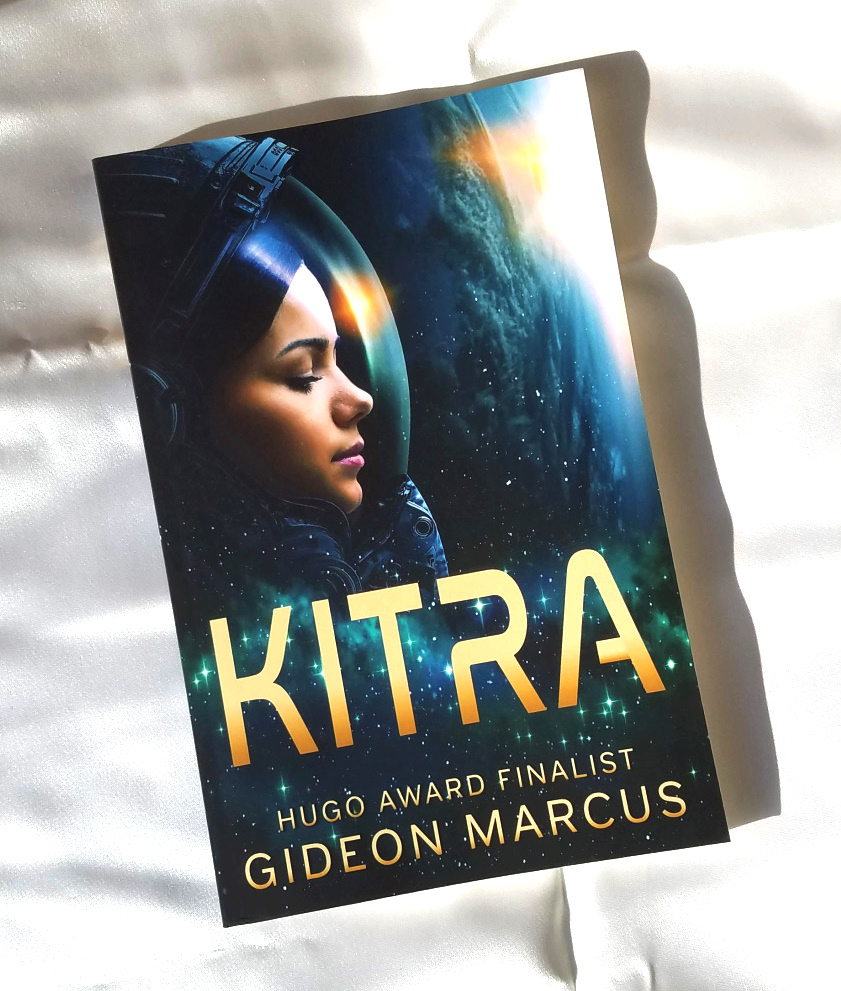[Today is the last day you can sign up at the reduced rate for next year's Worldcon. Don't miss your chance to vote in next year's Hugos!]

by Gideon Marcus
Science Fact
In '57, Asimov stopped being a full-time science fiction writer to become a full-time science columnist, a change in vocation that has largely been a positive one. Why did the creator of Nightfall, Foundation, and Susan Calvin make the leap? Because, with the launch of Sputnik, science fiction had suddenly become reality, and the front page of the newspaper contained some of the most thrilling SF headlines going.
That trend has only accelerated. This month, we entered the next stage of space travel, not with a flashy Gemini launch (though those are nifty!) or our first manned trip to the Moon, but with something called ATS.

NASA's "Advanced Technology Satellite" went up on December 7, 1966. Some satellites, like TIROS, are weather satellites. Some, like SYNCOM, relay communications. ATS is the first to do both, and from geostationary orbit. At its altitude of 36,000 km, it takes exactly 24 hours to circle the Earth. Thus, from the ground, it appears to be standing still. Equipped with a "spin-scan" camera, every 20 minutes, ATS sends back a full-globe image of the Earth with a resolution of just 3km. For the first time, we have essentially real-time weather coverage of an entire hemisphere.

No less ambitious, but sadly less successful, was last week's three-day "Biosatellite" mission. Biosat is the first in a series of spacecraft that will observe the long term effects of orbital life on a variety of organisms. On board are a menagerie of bugs (including the ever popular fruit flies) as well as seeds and plants. The plan was to launch the mission on the 14th and then bring it back on the 17th, observing the effects of weightlessness and radiation on the living cargo. A retrorocket malfunction stranded the satellite in orbit, however. I suspect the SPCA is filing a lawsuit as we speak…

NASA isn't the only American agency conducting science. Last week, the Air Force launched two satellites at once in its low-cost "Orbiting Vehicle" series, OV1-9 and OV1-10. Normally, these go into polar orbits, but the latest duo follow more conventional paths. For the most part, these little guys investigate radiation, radio propagation, and other near-Earth conditions. This is all of great interest to an organization that wants to put flyboys in a Manned Orbiting Laboratory next year, but there's also a valuable scientific yield for the rest of us.
Science Fiction (and Fantasy)
After all that exciting real-world news, could an SF magazine hope to provide the same thrills? Turns out the first 1967 issue of Fantasy and Science Fiction does!

by Gray Morrow
The Little People (Part 1 of 3), John Christopher
Bridget Chauncey is the heir to a most unusual estate in rural Ireland: a run-down country home built on the site of a ruined castle. Enchanted with the place and its commercial opportunities, she essays a trial season running the place as a vacation lodge. An odd assemblage of characters are introduced: a bickering middle-aged couple and their daughter on the edge of womanhood, a ruddy Wehrmacht veteran and his half-Jewish wife, Bridget's practical fianceé, Daniel, the estate handler's son, Mat, and the cook and maid.
The Little People is slow to start, author Christopher allowing us to settle into the heads of each member of this queer group. But when a two-inch sandaled footprint is discovered, and linked to the recent rash of minor thefts, the identity of the culprit(s) quickly is determined.
Fairies are real.
This is where we leave off this compelling chapter. I look forward to the ramifications of "first contact" between giant and wee folk. Four stars.
The Star Driver, J. W. Schutz
Less impressive is this tale of a man stranded on an asteroid with rapidly diminishing air reserves. Rescue depends on propelling a beacon to orbital velocity. This Analog-ish tale would have been better served had the ending not been spoiled from the start by editor Ferman (and to some degree, the title).
On the other hand, I don't want to discourage F&SF from publishing, well, SF. So, a low three stars.
Interplanetary Dust, Theodore L. Thomas
Thomas suggests that the flux of micrometeoroids around the Earth might be netted up and squashed into a planetoid to live on. I don't think he's researched how thin that flux actually is.
Two stars.
The Disenchanted Symphony, James G. Huneker
Here's a reprint from the turn of the century! A Russian composer, infatuated with the link between music and mathematics, creates a symphony that punches a hole through the fourth dimension, whisking his wife and his orchestra away from our plane of existence. Can he get them back?
I was impressed with how modern this story felt. Judith Merril expressed in her Books column this month that SF owes much of its present sparkle to works created more than fifty years ago. She was talking about H.G. Wells. This sentiment could easily be said of Mssr. Huneker as well.
Four stars.
Bait, Bob Leman
Sometimes what a door-to-door salesman is peddling isn't the product he has on display. This is a deliciously subtle tale that gets better after a night's thought on it.
Four stars.
The Knight-Errant, the Dragon, and the Maiden, Gahan Wilson
Sometimes the dragon is a chaperone, not a jailer.
Cute. Three stars.
Right Beneath Your Feet, by Isaac Asimov
We're back to lists and geographical tidbits from The Good Doctor this month, this time describing what places lie directly opposite others on the globe. Well, at least I learned the etymology of the word "antipodes" (still don't know how to pronounce it, though…)
Three stars.
Kingdom Come, Inc., Robert F. Young
Last up, a Christmas story. Robert F. Young has never found a myth he hasn't wanted to shoehorn into a science fictional story. This time, he adapts a reliable well: Christianity. On the Seventh Heaven pleasure satellite, an angelic fellow named Mike shows up looking for a job. He and his six brothers (Gabe the trumpter, Raf, etc.) are out of work of late since no one has gotten into their particular establishment for many years.
It's an obvious tale and a tedious one, opting for the easiest, least challenging conclusion. Two stars.
Back to Earth
With the exception of the final tale (accepted more for its fortuitous length and timely theme, perhaps), this is a quite good issue. And with the unusual inclusion of a serial, there's all the more reason to look forward to the February issue when it arrives early next month.
Happy New Year, indeed!

by Gahan Wilson
[Today is the last day you can sign up at the reduced rate for next year's Worldcon. Don't miss your chance to vote in next year's Hugos!]

![[December 20, 1966] Above and beyond (January 1967 <i>Fantasy and Science Fiction</i> and a space roundup)](https://galacticjourney.org/wp-content/uploads/2021/12/661220cover-656x372.jpg)

![[November 22, 1966] Ha ha. Very funny. (December 1966 <i>Fantasy and Science Fiction</i>)](https://galacticjourney.org/wp-content/uploads/2021/11/661122cover-661x372.jpg)




![[October 22, 1966] Why Johnny Should Read (November 1966 <i>Fantasy and Science Fiction</i>)](https://galacticjourney.org/wp-content/uploads/2021/10/661022cover-653x372.jpg)





![[July 20, 1966] An Endless Summer (August 1966 <i>Fantasy and Science Fiction</i>)](https://galacticjourney.org/wp-content/uploads/2021/07/660720cover-672x372.jpg)






![[June 16, 1966] Calm Spots (July 1966 <i>Fantasy and Science Fiction</i>)](https://galacticjourney.org/wp-content/uploads/2021/06/660616cover-672x372.jpg)







![[May 20, 1966] Things to Come and Things that Are(June 1966 <i>Fantasy and Science Fiction</i>)](https://galacticjourney.org/wp-content/uploads/2021/05/660518cover-669x372.jpg)




![[April 16, 1966] Non-taxing (May 1966 <i>Fantasy and Science Fiction</i>)](https://galacticjourney.org/wp-content/uploads/2021/04/660416cover-664x372.jpg)





![[March 22, 1966] Summer in the sun, winter in the shade (April 1966 <i>Fantasy and Science Fiction</i>)](https://galacticjourney.org/wp-content/uploads/2021/03/660320cover-672x372.jpg)



![[January 20, 1966] Bombs, duds, and happy endings (February 1966 <i>Fantasy and Science Fiction</i>)](https://galacticjourney.org/wp-content/uploads/2021/01/660120cover-565x372.jpg)

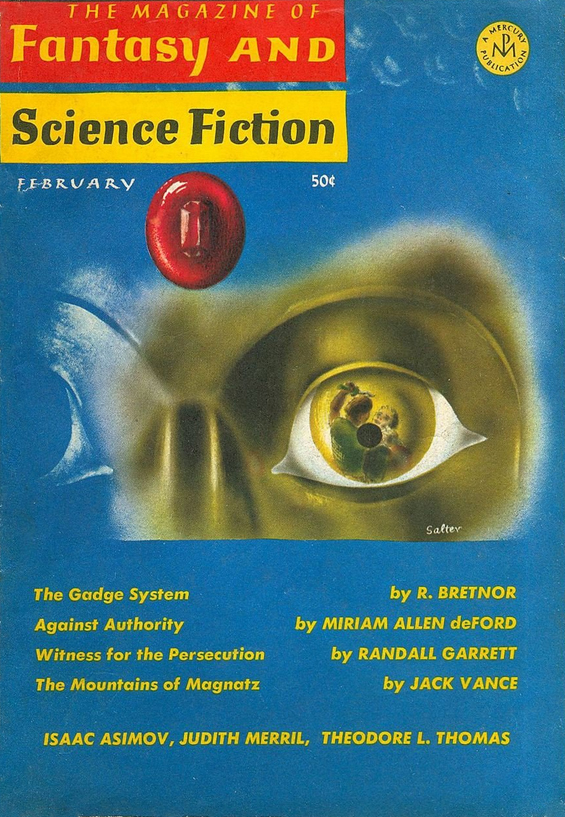
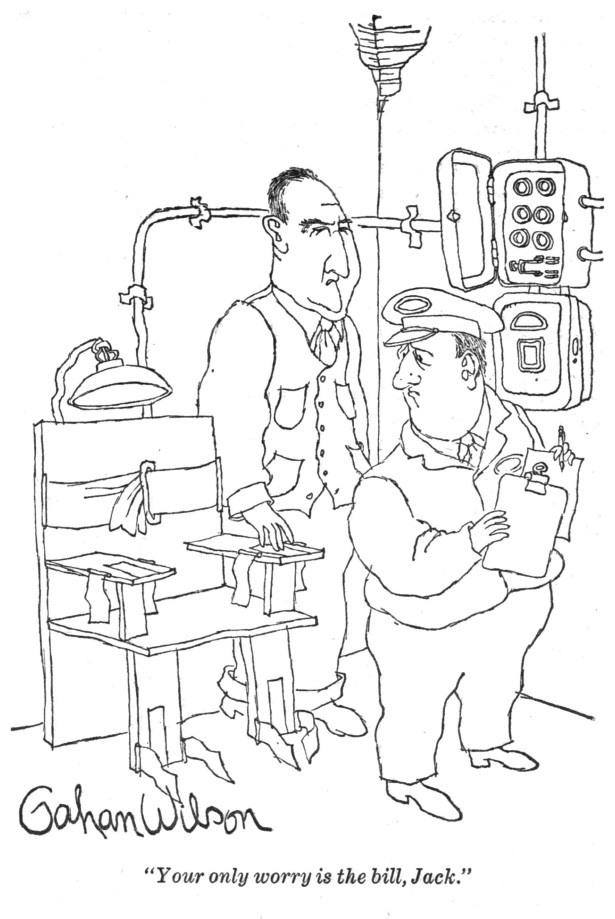
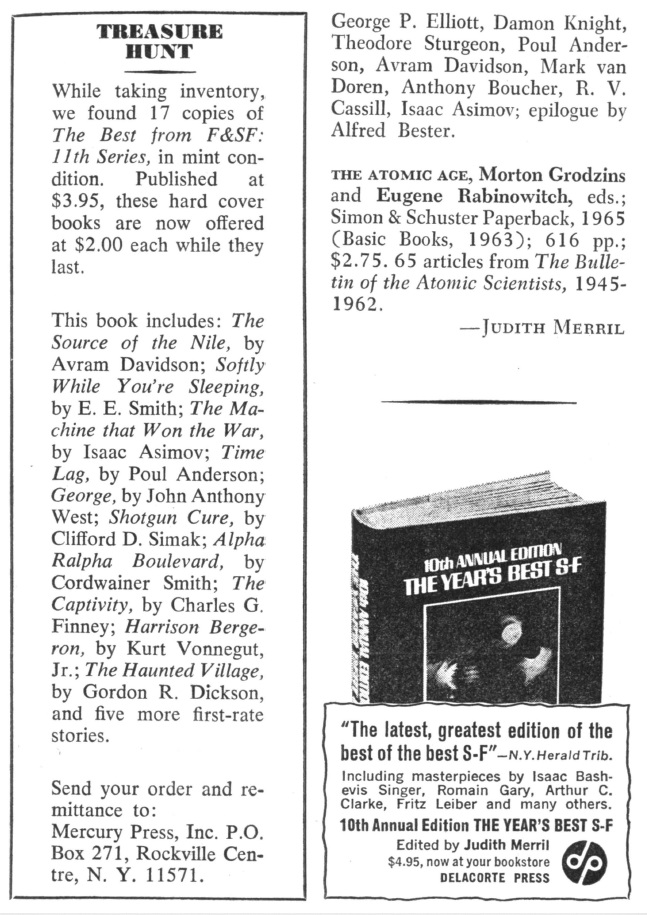
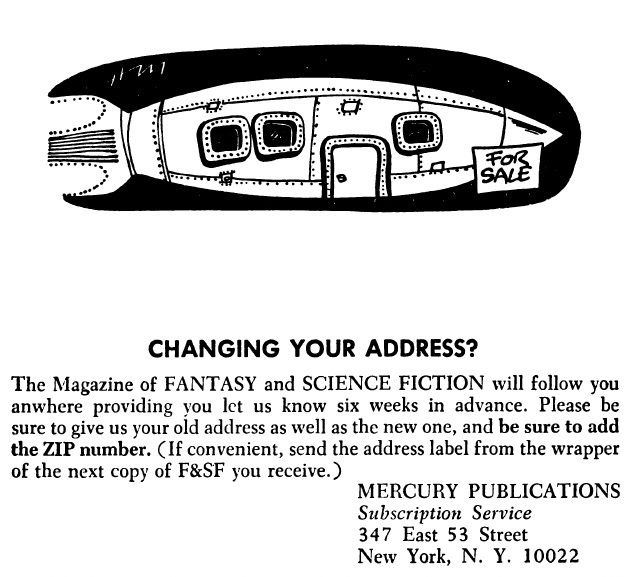
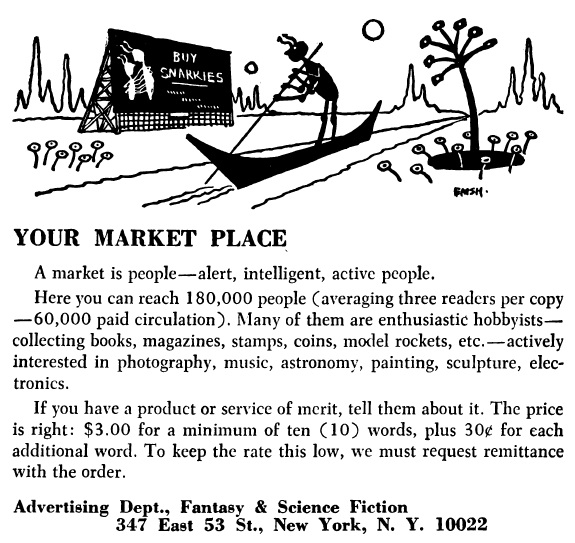
![[December 18, 1965] Bulges and Depressions (January 1966 <i>Fantasy and Science Fiction</i>)](https://galacticjourney.org/wp-content/uploads/2020/12/651216cover-672x372.jpg)




